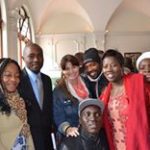Today, on June 20th, the world celebrates World Refugee Day. In Cape Town, civil society organisations and artists from all over the world gathered to honour the courage and strength of the millions of men, women and children who fled their homes under threat of persecution. About a hundred people attended the event which was organized by the UNHCR (United Nations High Commissioner for Refugees) and South Africa’s Department of Home Affairs, with collaboration by Sonke Gender Justice (“Sonke”).
According to a UNHCR report, there are more than 50 million refugees in the world, the highest number since World War II, and 65,000 in South Africa alone. Refugees in South Africa come from countries all over Africa, including Zimbabwe, Somalia and the Democratic Republic of Congo in search of freedom from violence and oppression. They often face challenges of integration here, and some have been the targets of xenophobia. The event today highlighted the fact that despite these formidable obstacles, many refugees have made extraordinary contributions to South Africa as musicians, designers, writers, public servants and activists.
The event featured runway shows displaying the collections of refugee designers — Rea’Nubia, Thread of Good Hope, Prosperity Fashion and Shwe-Shwe. Inspired by a variety of African traditional designs, the collections were well-received by attendees. The crowd cheered as the models – young African women of all shapes and sizes – walked down the runway. Many of the designs evoked the national origins of their designers. “We want women to wear clothes they identify with,” the announcer said as she introduced the collection of Patricia Matereure, a Zimbabwean refugee who had begun her design business with one sewing machine.
Several refugees, including human rights activist Abdillahi Ahmed Mohamed who works in Sonke’s Refugee Health and Rights programme, told their stories. Abdillahi recounted how he fled Somalia and was able to find refuge in South Africa. He explained that here he could pursue an education, and also help other refugees have better lives. Others spoke not only about the difficulties of being a refugee, but also of the persistence and resilience that comes along with it. One woman urged her fellow refugees not to “sit and feel sorry” for themselves but to take part in their new communities. An Eritrean refugee said that refugee students were “very serious students” and spoke with pride about the academic accomplishments of his children.
Jackie Mckay, the Deputy Director General of Immigration Services at the Department of Home Affairs, Shirley Gunn from the Human Rights Media Centre and Patrick Kawuma-Male from the UNHCR praised the courage and fortitude of refugees and emphasized the importance of an integrated South Africa. “Their stories is [sic] our stories,” Kawuma-Male declared to general applause.





